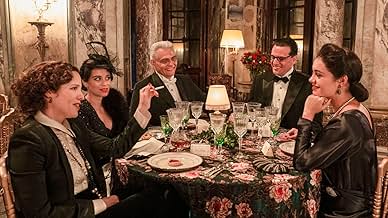Aracy is a young employee of the Brazilian Consulate in Hamburg. She helped Jews obtain visas to flee to Brazil, despite the Nazis'' growing animosity toward Jews.Aracy is a young employee of the Brazilian Consulate in Hamburg. She helped Jews obtain visas to flee to Brazil, despite the Nazis'' growing animosity toward Jews.Aracy is a young employee of the Brazilian Consulate in Hamburg. She helped Jews obtain visas to flee to Brazil, despite the Nazis'' growing animosity toward Jews.
- Awards
- 1 win total
Browse episodes
Featured reviews
A well told story, scripts, similar in genre to others who assisted Humans from a certain death. Well paced, interesting, and very good acting.
I would give much higher stars if it had not had a major plot oversight. It is the same error in every Hollywood or otherwise production. In the 1930s, Germany had AntiSmoking legislation. This legislation was very Strict. The only people in Germany who smoked from the 1930 until after 1945 were Foreigners. Showing nazi military staff, especially officers smoking in Uniform did not happen. No one smoked in public, in shops, when working, when on duty. Nazi officers were always in Uniform because they were always on duty.
Smoking only returned to Germany after 1945. UK and US created the huge market or their tobacco products. Post War Germans took up smoking in as a very high proportion of the population because to be a smoker was to portray one's self as... I was not a nazi, see... I smoked, the nazis did not smoke.
To this day, many decades, generations later, Germans still smoke far more than most other parts of EU and developed world. The stigmas of a previous eta still linger many generations later as exemplified by the percentage of smokers and the failure to fully eradicate smoking in places where people work.
Antismoking legislation in UK and PSAs have reduced smoking from 80% a century ago to 8% today.
I would give much higher stars if it had not had a major plot oversight. It is the same error in every Hollywood or otherwise production. In the 1930s, Germany had AntiSmoking legislation. This legislation was very Strict. The only people in Germany who smoked from the 1930 until after 1945 were Foreigners. Showing nazi military staff, especially officers smoking in Uniform did not happen. No one smoked in public, in shops, when working, when on duty. Nazi officers were always in Uniform because they were always on duty.
Smoking only returned to Germany after 1945. UK and US created the huge market or their tobacco products. Post War Germans took up smoking in as a very high proportion of the population because to be a smoker was to portray one's self as... I was not a nazi, see... I smoked, the nazis did not smoke.
To this day, many decades, generations later, Germans still smoke far more than most other parts of EU and developed world. The stigmas of a previous eta still linger many generations later as exemplified by the percentage of smokers and the failure to fully eradicate smoking in places where people work.
Antismoking legislation in UK and PSAs have reduced smoking from 80% a century ago to 8% today.
Aracy Moebius de Carvalho (1908 - 2011) was a Brazilian diplomatic clerk who from 1938 through 1942 worked at the Brazilian Consulate in Hamburg, Germany, as Chief of the Passport Section. She helped Jews by handng out visas without the red "Juden" letter that identified them. Her fellow diplomat and assistant-Consul Guimarães Rosa later become her second husband, and certainly the most important Brazilian writer since Machado de Assis. His masterpiece 'The Devil to Pay in the Backlands' (Grande Sertão: Veredas) was dedicated to her. With his help, she saved a great number of Jews from prison and death. The Holocaust, as we know, was a very long epic event, so this TV series presents , in a pictoric soft-focus manner, a side of the tragedy, a touching story, and a must see not only for the plot but also for not ignoring Evil. It's less a production about Jews than about a courageous woman who saves innocent people. Less about racialism than about the science to be yourself in dark periods. A series for reflectioning, for not ignoing the past. The vulnerability of society face to evil. At the very end of each chapter, as it switches into the present now, we see relatiuves of survivors, the Carvalho Jews: their offspring and the idea of how Aracy did not only save those people, but saved generations and future children. Each finale with real-life "Carvalho Jews" honoring their heroine is awe inspiring, certainly what you may call triumph over tragedy. There are several caveats to counteract, however. If Sophie Charlotte is passable in the role of Carvalho, Rodrigo Lombardi is too inexpressive an actor, even somewhat too old for the role of Guimarães Rosa. The sequence in which she drives a car transporting an underground Jew out of Germany is ridiculous: the fugitive is in the backseat of the car, she DOES NOT HAVE diplomatic immunity and the Nazi customs officers merely ask her to open the trunk, they don't even look or supervise the backseat... Come on...
On first viewing, I thought it was an American production. All the (Brazilian) actors speak in English and do not try to put on Brazilian or German accents for verisimilitude.
The sets are amazing, as standing-in for Hamburg in 1938-1942. Plus the casual anti-Jewish actions and brutality on the streets, almost (but not quite) incidental to the action. But demonstrating how casual that physical cruelty can be.
While others have decried some of the incidental matters (like American cars on the streets and badges of ranks), the dialogue is subtle and develops the plot(s) very well.
It's a story that needs to be told - from a source about which western history is too often ignorant. Brazil was the only South American country to commit forces to WW2 - 25,900 "Smoking Snakes" to Italy.
The sets are amazing, as standing-in for Hamburg in 1938-1942. Plus the casual anti-Jewish actions and brutality on the streets, almost (but not quite) incidental to the action. But demonstrating how casual that physical cruelty can be.
While others have decried some of the incidental matters (like American cars on the streets and badges of ranks), the dialogue is subtle and develops the plot(s) very well.
It's a story that needs to be told - from a source about which western history is too often ignorant. Brazil was the only South American country to commit forces to WW2 - 25,900 "Smoking Snakes" to Italy.
Would any of your readers know the theme music at the begining of the drama, It sounds to me like Samuel Barber's adagio for strings but it is not played long for me to tell.
The German uniforms are too sloppy, epaulettes far too big, old guard insignia on right arm is incorrect,
Farr too many American cars for Germany in WWII
But overall a great series.
Did you know
- TriviaThe miniseries is Globo's first English-language production.
- How many seasons does Passport to Freedom have?Powered by Alexa
Details
- Runtime1 hour
- Color
Contribute to this page
Suggest an edit or add missing content




























